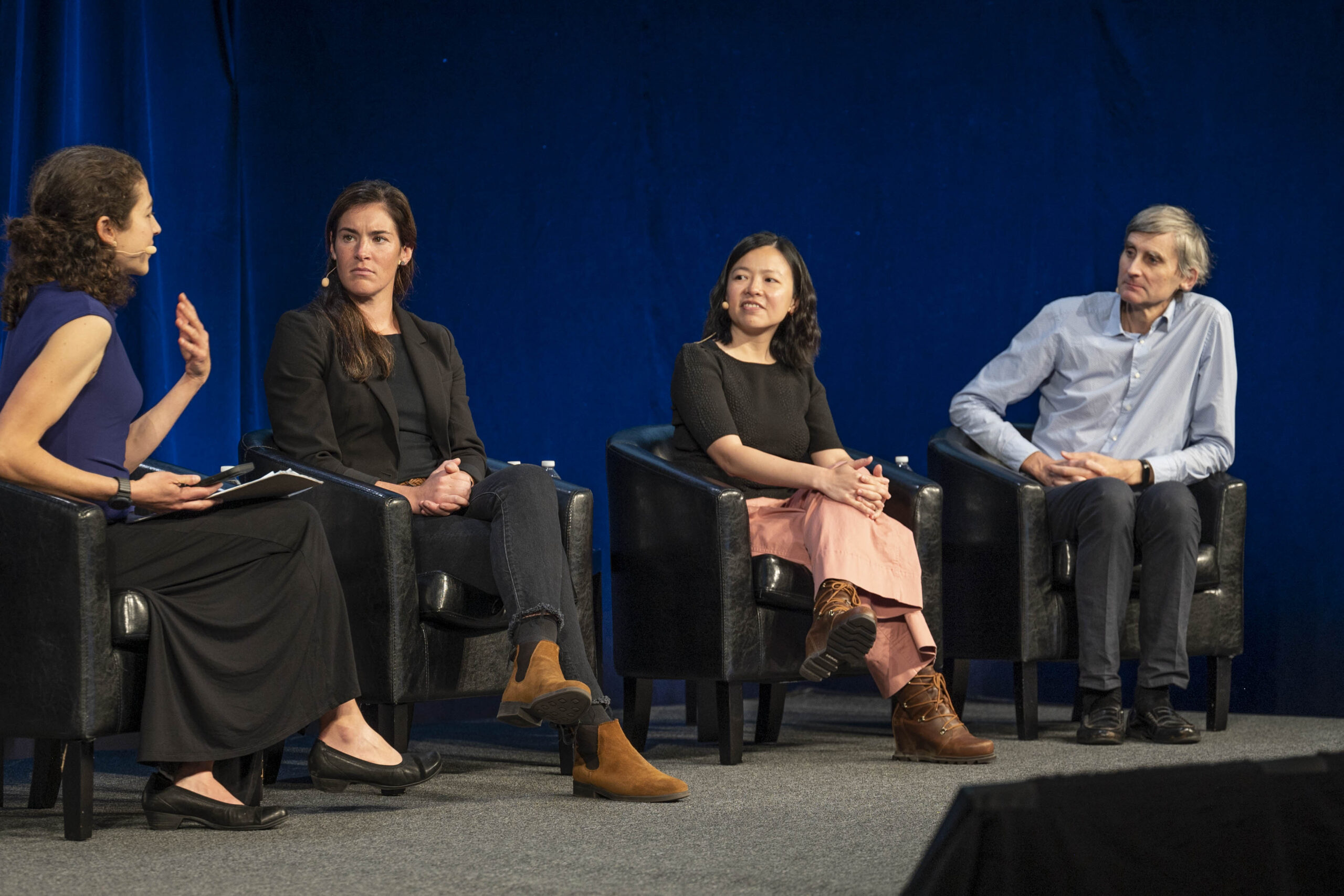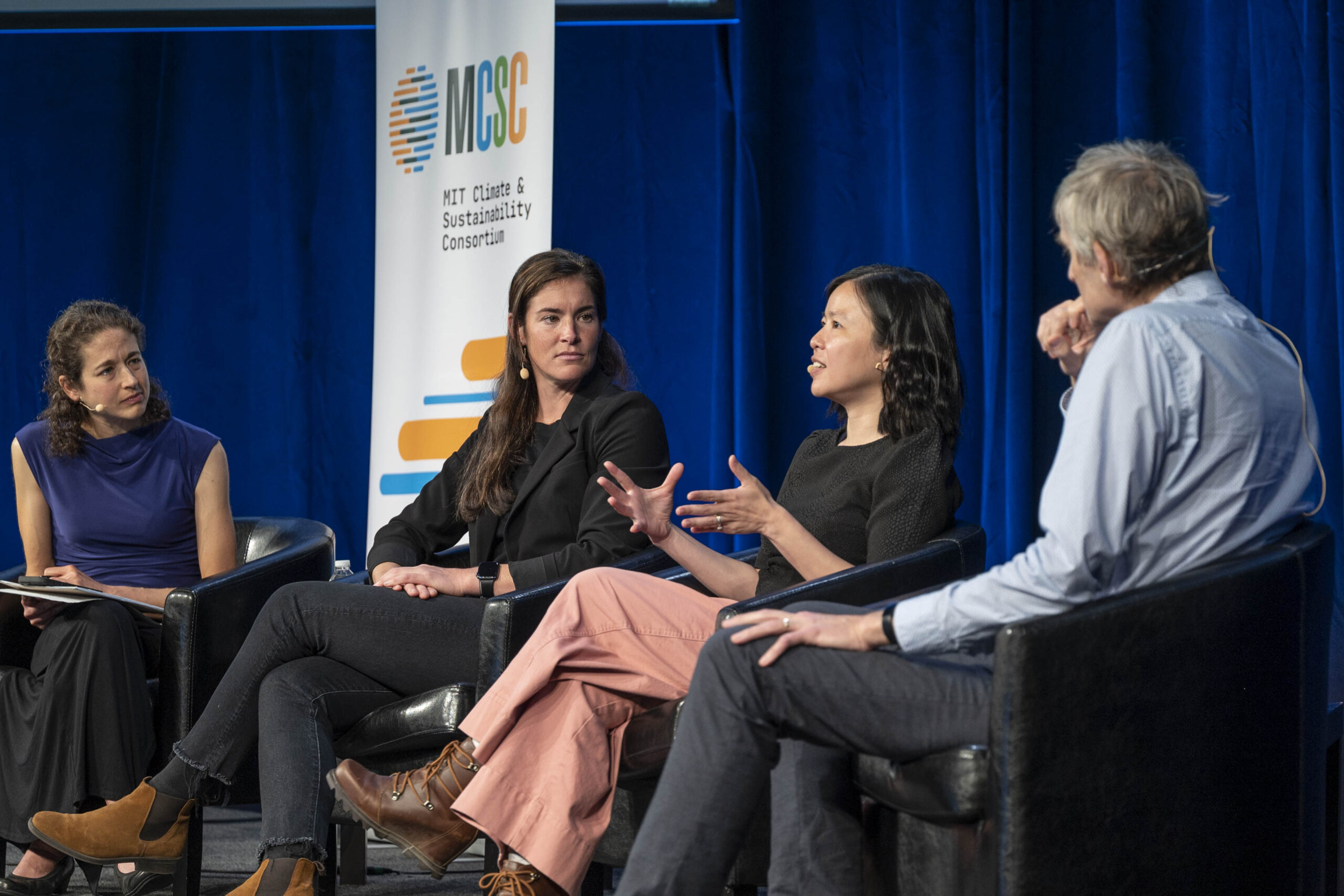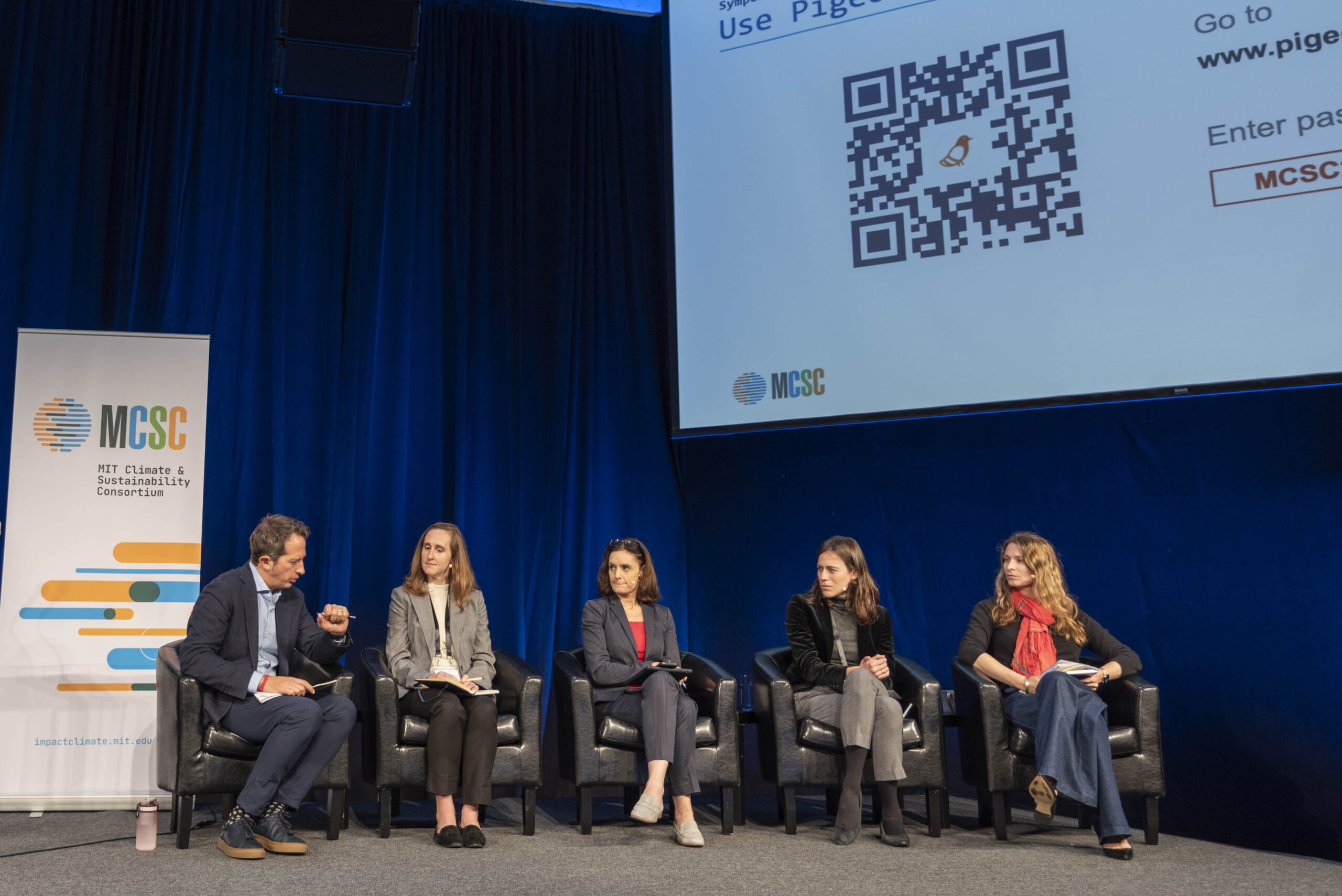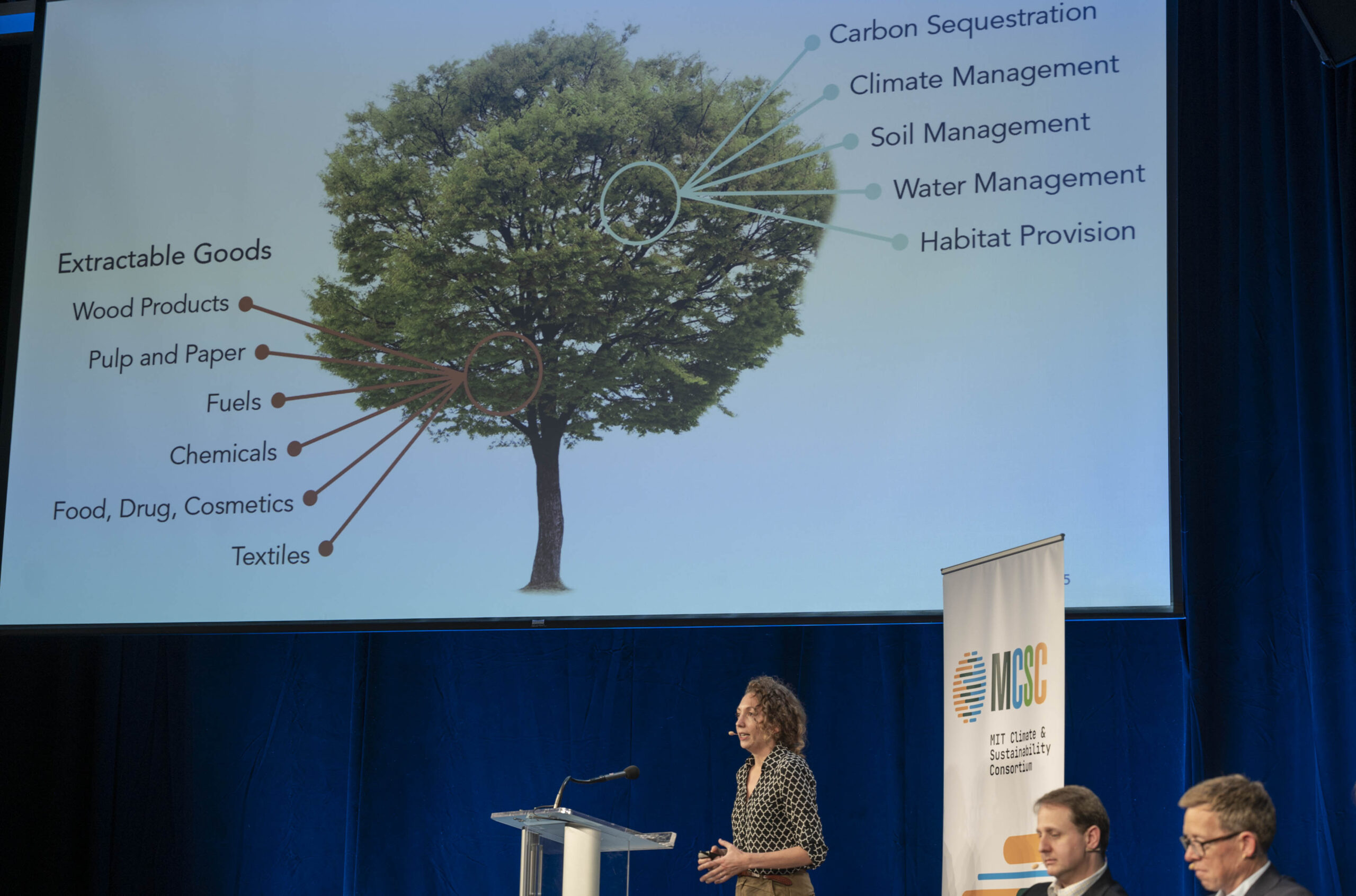MCSC Annual Symposium: Sparking cross-industry and interdisciplinary collaborations to drive innovations in climate change
February 6, 2023

MCSC Co-Director Elsa Olivetti addresses the audience at the MCSC's Annual Symposium. Photo by Christopher Harting.
Symposium hosted by MIT’s Climate & Sustainability Consortium highlights how different sectors and disciplines can come together to move the needle on addressing climate and sustainability challenges.
As companies across sectors work towards similar sustainability goals, greater partnership and collective action between supply chains, universities, government, and civil society will be the difference. This was the overarching theme of the MIT Climate & Sustainability Consortium’s (MCSC) 2022 symposium, which showcased the benefits of academia-industry collaboration over climate and sustainability topics, bringing together experts and industry leaders to present a range of sessions, from climate implications of computing and communications to climate finance and entrepreneurship.
In opening remarks, the MCSC Chair and Dean of the MIT School of Engineering Anantha Chandrakasan noted that the MCSC’s model of collaboration between academia and industry includes partners from across the global economy, working together to define cross-industry needs and bring domain-specific problems to the attention of the MIT community.
“Over 100 technical team members across all 18 member companies are piloting cross-consortium opportunities to accelerate climate and sustainability solutions in circularity, carbon removals, and decarbonizing tough sectors.”
Climate implications of computing and communications
Within eight years, computing and communications are expected to consume more than 20% of the world’s electricity and account for up to 23% of global greenhouse gas emissions (1). The amount of data worldwide has more than doubled over a two-year timeframe, providing just a glimpse into the rapid exponential growth that experts anticipate. While computing and communications are deployed to address environmental challenges, manufacture and use of electronics has significant implications on carbon emissions, materials and chemical use, waste generation, and energy consumption.
The MCSC’s virtual workshop in March 2022, co-hosted with MIT-IBM Watson AI Lab and the Schwarzman College of Computing, explored energy-efficient options for current technology and provided insight into innovations that could yield higher efficiency in computing. This set the stage for a discussion at the symposium, moderated by MCSC co-director Elsa Olivetti, Esther and Harold E. Edgerton Associate Professor in Materials Science and Engineering at MIT.
Panelists from MIT, Meta AI, and Apple (an MCSC member company) noted that as computing tasks become more efficient, this leads to more consumption (Jevon’s paradox). They also discussed how the upstream burden of energy use, or embodied carbon footprint, is dominated by manufacture of components like semiconductors.
As the semiconductor industry consumes so much energy, this space is ripe for transformation and collaboration. “Because of different components coming from different continents, understanding environmental implications requires all players to come together,” said Carole-Jean Wu, Research Scientist and Technical Lead Manager at Meta AI.

(L-R) Co-Director of the MCSC Elsa Olivetti leads discussion with Susannah Calvin, Carole Jean-Wu, and Jesús del Alamo on the climate implications of computing and communications. Photo by Christopher Harting.
Opportunities are evident to facilitate the types of cross-cutting work and collaboration needed to tackle climate problems in this field, with potential solutions lying in specialized technologies for AI accelerators, power management, and communications, such as chiplet integration. Additional approaches include thinking about where computing is happening, whether in the cloud or on devices; extending system lifetimes while maintaining performance; developing novel computational approaches; and finding ways to address increased memory demands.
Due to the complexity and impact of supply chains, disruptive change is needed in designing carbon-aware systems, which are in part dependent on the implementation of robust metrics and accounting. In addition, environmental metrics being considered for future decision-making go beyond carbon and include water, racial justice, and equity. Thus, frameworks must address the disproportionate impacts of environmental risks on vulnerable communities, as well as drive economic opportunity for those communities.
Panelists emphasized the need to collectively tackle problems and engage the community. One way to do this is through collaboration across the interlinked spheres of education and industry. “By achieving a network, everyone benefits by seeing progress,” said Jesús del Alamo, Donner Professor, Department of Electrical Engineering and Computer Science, MIT.

Audience members listen to discussion on the role industries should play on the future of climate and sustainability research at the MIT Media Lab. Photo by Christopher Harting.
Checking the pulse with climate leaders
MIT students see no more urgent issue than the climate, an impetus reflected in many initiatives on campus. Representatives of these various efforts presented on the ways in which MIT can move the needle on climate and sustainability.
MIT climate leaders who spoke included Associate Provost Richard Lester, Japan Steel Industry Professor and Associate Provost; Rob Stoner, Deputy Director of the MIT Energy Initiative; Desirée Plata, representing the MIT Environmental Solutions Initiative; Jason Jay, Director of the Sloan Sustainability Initiative; and Jinhua Zhao, Founder and Faculty Director of the MIT Mobility Initiative. The MCSC is thrilled to be working closely with these entities and what they aim to achieve.
The Climate Grand Challenges initiative is designed to mobilize the Institute’s entire research community around tackling the most difficult unsolved climate problems. Prof. Lester noted that the whole-campus effort on climate is focused on delivering impact, and is problem-and-opportunity-led.
“Our approach is to combine the creativity and ambition and energy of our research community with the know-how and financial resources of MIT’s industrial, financial, and government partners to deliver game-changing advances—in time to make a difference."
The MIT Energy Initiative (MITEI) is a hub for energy research, education, and outreach. It has influenced major policies including the recent CHIPS Act and the Inflation Reduction Act. Taking on a role to create options and communicate them, MITEI produces the multidisciplinary “The Future Of” studies, from “The Future of Nuclear Power” in 2003 to the most recent, “The Future of Energy Storage.”
Founded in 2014, the MIT Environmental Solutions Initiative (ESI) has research thrusts in plastics, mining, cities, and natural climate solutions. Their other initiatives include an undergraduate minor in Environment and Sustainability, career-fair opportunities, conversations with companies on sustainability actions, and a Webby award-winning online learning tool.
The MIT Sloan Sustainability Initiative’s (SSI) Aggregate Confusion Project is working to improve the quality of measurements for environmental, social, and governance (ESG) factors to aid in decision-making and policy-planning. SSI’s Climate Pathways Project provides interactive simulation tools for climate transition, running workshops with US senators and government leaders as well as engaging with companies’ executives to build a shared understanding of the system and risks.
The MIT Mobility Initiative has numerous transportation-related projects, including efforts to decarbonize the mobility system while ensuring equitable access to opportunities, and establishing a socially acceptable safety criteria for autonomous and connected vehicles, which is urgent given the 43,000 traffic-accident deaths in the USA last year. “No single organization can do this,” said Prof. Zhao, “Academia, government, and industry must gather to make decisions together.”
Bringing an additional industry perspective to the topic of climate advances, Dr. Samuel Wagstaff, aluminum process and product consultant at Oculatus Consulting, emphasized how sustainable initiatives do not always have to be profit negative by sharing the origin story of the aluminum beverage can.
Recycling “the aluminum beverage can started out as a means to clean up litter, and has turned into one of the most profitable products in the rolled aluminum space,” said Wagstaff. “Sometimes the ethical thing to do can also be the profitable thing to do. Those two perspectives don’t have to be opposed.”

(L-R) Jason Jay, Susie Boshoff, Heike Reichelt, Beatriz Roa, Elizabeth Teague discuss the role of finance in accelerating climate solutions. Photo by Christopher Harting.
How finance can accelerate climate solutions
Transition to a decarbonized world requires the physical transformation of various systems that society depends on, from energy to agriculture. This transition can be driven by large companies, a principle on which the MCSC was founded—but businesses must have motivation, technology, and working capital, according to Jason Jay, director of the Sloan Sustainability Initiative, who moderated a discussion on climate finance.
Climate finance can be viewed from two perspectives: 1) entities looking for investment opportunities; and 2) companies making financial commitments to meet climate and sustainability targets. In either case, challenges lie in how to invest for maximum impact on carbon reduction and social enhancement, as well as how to monitor and measure the predicted or promised impacts.
Panelists represented multiple perspectives, including a company issuing bonds (PepsiCo), a bank underwriting investments (BBVA), an organization making investments (World Bank), and an impact investor supporting small-and-growing agricultural enterprises (Root Capital).
Heike Reichelt, Head of Investor Relations and Sustainable Finance at World Bank, acknowledged that the technology for renewable energy exists; but regulatory frameworks, connectors, and capacity-building is still needed for developing countries hardest hit by the climate crisis, and these countries need support in order to finance necessary investments in mitigation and adaptation. For participants in a forum like this, the motivation is clear.
“You can’t eradicate poverty if you don’t solve the climate crisis.”
Following Reichelt’s description of the first green bond issued by the World Bank in 2008, panelists discussed the topic of green bonds, securities issued to finance environmentally oriented projects. “Green bonds are helping us to accelerate investment in our pep+ (PepsiCo Positive) agenda, and to convey to external stakeholders the link between finance and impact,” said Susie Boshoff, Sustainability Director of ESG Reporting at PepsiCo, who also emphasized the need for investor-grade ESG data.
In 2019, PepsiCo was first in the food and beverage sector to issue a green bond, and the company followed up in 2022 with the issuance of a second green bond. PepsiCo’s annual use of proceeds reporting includes detail on how the net proceeds supported progress in water sustainability, sustainable plastics and packaging, and decarbonization of its operations and supply chain.
Jay noted the need to improve tracking capital to ensure it is used specifically for projects with positive outcomes. Investors also must balance climate impact with financial rate-of-return. Beatriz Roa, Global Sustainability Director of BBVA noted that their approach to investment is progressive, to accommodate the fact that “clients will take time for transition.”
“We’ll see some fossil fuel financing because the economy isn’t fully sustainable yet,” said Roa. “Full decarbonization will take time, and standards will evolve.”
Finding a balance can be particularly challenging in a market where the social costs are difficult to calculate, especially without a set carbon price. “We’ve heard that renewable energy is more expensive, but it’s probably the case that fossil fuels are too cheap because we’re not pricing in the impacts,” said Reichelt. “It’s a complex problem.”
“A higher price for carbon that reflects the true cost of mitigation would be hugely transformative,” said Elizabeth Teague, Director of the Climate Resilience Initiative at Root Capital. Teague emphasized that a stronger carbon price and market would generate income for vulnerable communities on the frontlines of climate change who are supporting climate change mitigation. This carbon income could then be used to pay for key adaptation and resilience strategies, a key priority.
Panelists agreed that for financing mechanisms to integrate mitigation and adaptation of climate impact, bond issuance must shift towards sustainable bonds that jointly address green and social issues. Transparency will be an important pathway to that goal.
Teague also indicated the need for concessionary or impact investing. “Some climate investments, especially related to adaptation, don’t deliver commercial returns—but thankfully investors are increasingly willing to accept a lower rate of return in exchange for climate impact,” said Teague.

Ashley Beckwith, Founder of Foray Biosciences, presents to a mixed panel and audience members. Photo by Christopher Harting.
New investment in climate and sustainability startups
A panel on entrepreneurship, moderated by MCSC co-director Jeffrey Grossman, delivered a lively discussion on a series of aspects related to commercialization of sustainability startups. Topics ranged from when to spin out (and when not to), to diverse mechanisms for investment and how to approach the people with capital, to how to form the right partnerships. Panelists for this session were: Maureen Stancik Boyce, Managing Partner at Good Growth Capital; Jan-Willem Jannink, Global Responsible Value Chain Lead at Accenture; Matthew M. Nordan, General Partner at Azolla Ventures; and Christopher A. Schuh, POSCO Professor of Materials Science and Engineering at MIT. They were selected as experts from three stakeholder groups: the market, investors, and founders, each offering different viewpoints on the path to spinning out.
Specific questions addressed included how to identify opportunities to both shorten timelines and increase success of research translation, how to better leverage our diverse “stakeholders in the room,” and what the biggest failure modes are for start-ups.
After the Q&A session, panelists provided critical feedback to three start-ups that align with the MCSC Impact Pathways in a unique opportunity for start-up teams to pitch to multiple stakeholder groups at once. Unlike traditional pitch competitions where the panel is typically comprised of investors only, this setup made for particularly interesting and engaging analysis, questions, and conversation.
The three participating start-ups were with Sidhant Pai from StepChange, Joe Rodden and Branko Zugic from Lydian Labs, and Ashley Beckwith from Foray Biosciences.
An emergent theme through the range of panels is that the best—or only—way for various sectors to reach sustainability goals is to leverage the strengths of each and work together. The 2022 symposium demonstrated how the MCSC continues to connect individuals and entities across industry and academia, creating opportunities to collaborate for lasting impact.
- S. Andrae and T. Edler, “On global electricity usage of communication technology: trends to 2030,” Challenges, vol. 6, no. 1, pp. 117–157, 2015.
